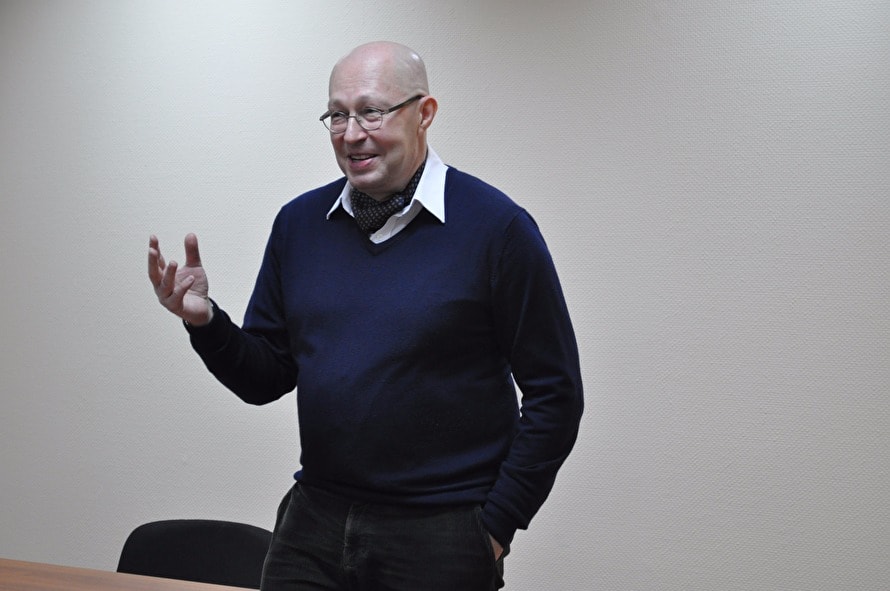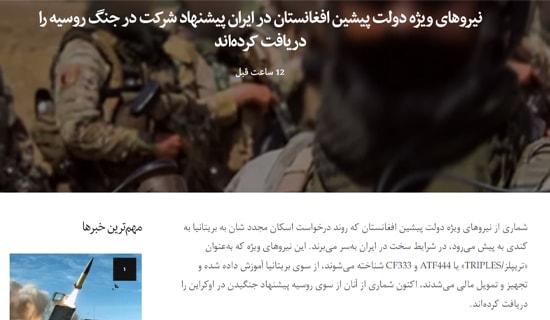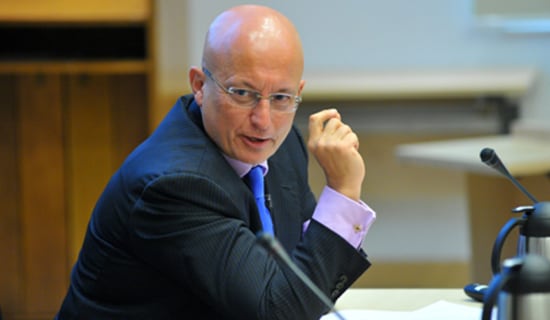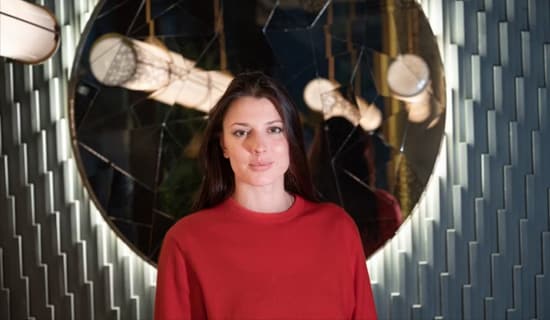The Russian media outlet Fotanka.ru published a long interview by Irina Tumakova on events Russian lawmakers should anticipate in 2017 with one of the most influential and highly quoted intellectuals, Professor Valery Solovei.[1]In the interview, Solovei stated that Russia will witness "the start" of a "very serious political crisis in 2017," which will last for about three years. He further explained that the political crisis will be characterized by the "growing incapacity of the state power to make decisions", and implement them. "And at the same time it's the increase of mass discontent; the society refuses to trust this power. And the refusal gathers strength. I think this process will take two or three years. But it will start in 2017. And the presidential election of 2018 will be an important, maybe even critical, stage of this crisis," Solovei stated.
According to the Russian intellectual, Russian President Vladimir Putin may for run for the presidency in 2018. However, a constitutional reform would allow Putin to retire from the presidency but retain control. In a previous interview with Russia's daily newspaper Moskovsky Komsomolets, Solovei reported about a large-scale constitutional reform in the works that will reduce the Russian presidency to implementing primarily ritualistic and representative functions, but will confide real power to the hands of the head of the State Council. "A post that Putin, naturally, will assume," Solovei added. At the moment, the State Council is a consultative and extra-constitutional organ, this is the reason why a constitutional reform would be needed.[2]
Commenting on U.S.-Russia relations, Solovei said that Moscow can offer Washington to "to untie the Syrian knot", and to put pressure on North Korea. However, he added that "Americans don't care about Russia," since "they are busy with their own problems." Solovei stressed: "And if they decide that we are their problem, they will exercise pressure. In the meantime, we are trying to pretend that we are not a problem for them." Solovei also warned that contrary to U.S. former president Barack Obama, who "was a rather weak president in the sphere of foreign policy," U.S. President Donald Trump could apply "very strong pressure" on the Russian elite, within "a very short time."
Below are excerpts from the interview with Solovei:[3]

Valery Solovei (Source: znak.com)
Solovei: 'The [Russian] Authorities Cannot Offer... The Society Any Positive Prospect, In Any Sphere Of Life'
Q: "What political events of 2016 do you consider important enough to impact 2017?"
Solovei: "Last year was not very rich in political events. One cannot claim that the State Duma election, especially in the way it was conducted and its results, was important or in any way fateful. More memorable are the events of the end of the year. Such as minister [Alexey] Ulyukaev's arrest[4] or Alexei Navalny's declaration that he was planning to run for the office of president of the Russian Federation.[5] That's why I think that when historians evaluate 2016, they will not measure its abundance in events but rather the trends that were formed during this year. First and foremost, it is the start of gradual politicization of the Russian society. It is not clearly seen to the naked eye, but I think that it in 2017 it will already be quite clear."
Q: "How does this politicization manifest itself?"
Solovei: "Our state interferes in all spheres of life, including private life. It is even interested in who sleeps with whom and in what way. When it starts intruding everywhere, it produces growing resentment. The resentment will sooner or later spread into the area of politics. Because any matter where the authorities interfere becomes a matter of politics by definition. It is not unique to Russia, but is a worldwide phenomenon: any issue where the powers interfere immediately becomes a political issue. If the authorities interfere everywhere, they are the ones turning any issue into politics."
Q: "Why do they do that?"
Solovei: "Out of fear. They want to control everything. They think that if they are in total control, there will be fewer unexpected developments. But in this way, they provoke mounting resentment and aggression in people."
Q: "That is, the opposite effect is achieved?"
Solovei: "Precisely. And some people are even beginning to realize that. Characteristically there are already attempts to call [Culture] Minister [Vladimir] Medinsky to order, to try and avoid politicization of culture. Because we used to have culture. For example, you didn't want to know anything about politics, it was all esthetically disagreeable to you. Suddenly, you realize you cannot visit an exhibition or go to a concert anymore, because there are some church banner waving, anti-Maidan militia units there. Because minister Medinsky starts telling you how to evaluate certain historical events. And the minister is a state official. And this causes strong resentment."
Q: "The second half of 2016 was relatively quiet. Putin, in his address to the Federal Assembly was peacefulness itself.[6] Is this a manifestation of the fact that certain things have gotten through to the authorities?"
Solovei: "No, it's a manifestation of the fact that [first deputy chief of chief of the Presidential Administration, Sergey] Kiriyenko has received an instruction to patch up relations with masters of culture.[7] But the machine has been put in motion. It has strong momentum, you cannot just stop it. What is the easiest job for the law (or lawlessness) enforcement bodies? Catching those who like or repost social network posts. They will register a crime solved, and they don't even have to sweat for it, it's enough to join [the Russian social network] VKontakte."
Q: "Politicization of society is one trend. What are others?"
Solovei: "The authorities cannot offer the people, the society any positive prospect, in any sphere of life. This 'peacefulness' you've noticed in the presidential address is easily explained: he has nothing to say. Simply nothing about what is actually troubling people."
Q: "Previously, when those in power had nothing to say, they explained to us that it was all the fault of 'our Western partners'."
Solovei: "No, earlier, from 2003 to 2014, Putin had something to say because the economic situation was not bad, despite the crisis of 2008-2009. People had hopes for the future. And they would invent and construct what was missing in their heads. They knew that we were in the upward trend. And as long as we are in the uptrend, those in power may be forgiven many things."
Q: "But I meant the explanations after 2013."
Solovei: "Then, for two years, from 2014 to 2015, the authorities kept explaining to us that greatness comes with a price. But the problem is that you can't feed people with greatness. And this propaganda of greatness stopped being effective long before now – a year ago, at the turn of 2015-2016. And now the president has nothing to say. When will we see the light at the end of the tunnel? He cannot even tell people when the tunnel will end. This creates apprehensions in people – even those who don't think about it (and those are the majority). People get the feeling that this crisis is here for a long time that the authorities cannot offer any solution. Accordingly, they cannot feed us the stability spiel any longer. What kind of stability is it when life gets worse and worse? Incomes decrease. Two years ago the president said: you need to be patient for two years – and then everything will be OK."
Solovei: 'The Official Forecasts Predict 15-20 Years Of Poverty'
Q: "Two years have passed, and the situation is not as dire as it seemed."
Solovei: "Yes, but the official forecasts predict 15-20 years of poverty."
Q: "How many of the 86% of the population see these forecasts?"
Solovei: "They don't have to see them. People feel. Many things that people are unaware of, that they don't reflect upon, they sense instinctively. And they react by their behavior. Why do people spend less money? Not only because their income has decreased. They have some savings. But they feel instinctively – this crisis is serious. And the state sees this. And it says: so, you don't want to give your money to us – then we'll take it from you. We will introduce entry fee into the city, entry fee into courtyards, we will pull the money out of your pockets."
Q: "This is definitely something people don't like at all."
Solovei: "That's what I'm talking about: the state offers nothing, gives no hope, and wants to take from you. This produces resentment. And it all started to become apparent in 2016."
Q: "In what way will this discontent and this politicization manifest themselves?"
Solovei: "They are already apparent. For example, the so-called urban activism is on the rise. There are more and more organizations in Moscow that defend the rights of hoodwinked stakeholders and car owners and protest against infill construction. I know that the same is happening in other large cities. This movement is not political in and of itself. It pursues no political goals. It just says: let us live normally, let us have a say in the decisions on issues that are relevant to us. People are just protecting their interests."
Q: "Has this reached the level where people don't care what to protest against as long as they can give vent to their frustration?"
Solovei: "No, people are not making a stand against anything. They say: we don't want this or that because it decreases our income, makes our lives worse, negatively affects the urban environment. They do not make any political demands; they do not say it's all because of Putin or United Russia. But sooner or later, it will come to that."
Q: "How can this happen? There are those who understand this, but most people, as I understand from my talks with them, have to have this connection explained to them."
Solovei: "There's no need to explain anything! Or to raise political consciousness. People will get to it themselves. They cannot change anything because such is the nature of power. And if such is the nature of power, sooner or later you find yourself faced with a dilemma: either I go on suffering or I make a stand against this power. And there are always 3-4 percent of people who say: we will no longer tolerate this. This is quite enough. You don't need 86 percent. These figures – 86%, 14% - mean nothing for politics. They matter in voting only, not in mass public politics. Because 86% always sit at home, whereas 14% may actually take to the streets."
Q: "But the people in power are no fools, they must be aware of this."
Solovei: "Firstly, let's not overestimate their intellectual capabilities. The power in Russia, like everyone else, acts on the principle of 'as long as everything's quiet – thank God', the people have swallowed this until now, so they'll continue to do so, and somehow it will go away. And if it does not – we have law enforcement agencies. But the problem is that there are no law enforcement agencies. It's all a giant sham."
Q: "What about the National Guard?"
Solovei: "What about it? There is no National Guard. It was meant to be some sort of elite unit. But as it turned out, it was not elite at all. Moreover, the efficiency of police has decreased abruptly. The National Guard consists of the same former policemen whose lives have become much worse. When they joined the National Guard, they lost some of their income. They are taxpayers, just like everybody else, but the authorities demand more from them, and the people are not very fond of them. Their lives are no picnic. So it all hangs by a thread."
Q: "What happens if this thread snaps?"
Solovei: "It can still hold on. You know, it's always like that in Russia: there is nothing temporary that could not be turned into a permanent fixture. A building is about to fall down – let's reinforce it with piles. There is a crack in the wall – let's put some wallpaper on it, it'll hold the wall together."
Q: "The appointment of Kiriyenko to the post of deputy head of the presidential administration, in charge of domestic policy, is it one of those 'patches'?"
Solovei: "No, there are other reasons behind it. And not only political ones. Simply put, a certain group wanted to remove Kiriyenko from Rosatom [State Atomic Energy Corporation], take Rosatom under its own control. And Kiriyenko did not want to leave. Nevertheless, Putin trusts him personally and values him highly. Kiriyenko was picked, firstly, for the election campaign, and, secondly, for the constitutional reform. And there are several versions of this constitutional reform that are being prepared under his supervision."
Q: "What do they want to change in the Constitution?"
Solovei: "To redistribute authority in state government bodies and create new government bodies. The most well-known part of what they discussed is the establishment of the State Council, a competent state authority. It is not the only variant, there are several of them, but it does not mean all of them will be implemented. Or any of them. Because the National Guard experiment has turned out to be most unsuccessful, and this curtails the implementation of the reform. There are preparations for it, to be sure; maybe the preparations are over already. In the same way, the economic reform is being prepared. Putin gave the assignment– and it's under preparation. First, it was [former Minister of Finance Alexey] Kudrin who was responsible. Now they are speaking about some integrated governmental program, into which Kudrin's ideas will be incorporated. There are already several versions of reform lying in the basements of the [Russian Prime Minister's] White House, but it does not mean anything."
Q: "Political protests, constitutional and economic reforms – how come everything grows, ripens, but does not actually come to fruition?"
Solovei: "It can all go on for quite a long time at a slow pace. And then, one day at an ugly moment and for someone else perhaps a gorgeous moment it can all explode. A weak spot will reveal itself, and – after all, a chain is only as strong as its weakest link."
Solovei: 'I Do Not Rule Out The Possibility That [Putin] Will Not Run [For The Presidency In 2018]'
Q: "Should we fear it in 2017?"
Solovei: "Nobody can tell you that. I believe that we will see the start of a very serious political crisis in 2017. I'd like to emphasize – only its start. The crisis itself will last for about three years."
Q: "What do you mean by the words 'political crisis'? What will it look like?"
Solovei: "It is a growing incapacity of the state power to make decisions, and what's more – to implement them. And at the same time it's the increase of mass discontent; the society refuses to trust this power. And the refusal gathers strength. I think this process will take two or three years. But it will start in 2017. And the presidential election of 2018 will be an important, maybe even critical, stage of this crisis."
Q: "Can you already tell who will run for presidency in 2018?"
Solovei: "I can't even tell whether Putin is going to be a candidate. He is getting ready for the elections, but it has not been finally decided yet."
Q: "He said recently that he was very tired and that he would like to travel but the president's job does not let him."
Solovei: "He said it twice over the past two months, which is not typical of him. So, I do not exclude the possibility that he will not run."
Q: "I will ask the pet question: if not Putin – who then?"
Solovei: "Dmitry Medvedev. He is the most suitable candidate."
Q: "And how do you evaluate Navalny's chances?"
Solovei: "If he can work out the right message to give to the country, he could have a good chance. He has the social networks, the population of large cities that he can win over... I think his chances are underappreciated. If he approaches it in a competent and sensible way, he can challenge Putin. And even defeat him."
Q: "Medvedev or even Navalny – will Putin simply retire and travel?"
Solovei: "I don't think so. This is what the constitutional reform is about: to let him retire but retain control. But nothing is decided yet. Any decision in Russia, especially now, is put off till the last moment."
Q: "What do you mean by the 'last' moment?"
Solovei: "When you can no longer delay the decision, you have to make it. That is, you had to make it yesterday, so you'll make it today. Because you always count on the chance that the circumstances will change for the better. By the way, it was Putin who started it. This hope that fate may throw you a surprise: oil prices will go up, Brexit, Trump will be elected president, etc."
Q: "How can Trump's election affect Russia? Watching the news, one gets the impression that his victory in the U.S. is Russia's new national holiday, as if a new 'good supervisor' was appointed instead of evil Obama."
Solovei: "Such is the Russocentric character of our propaganda; it shows that the entire world revolves around Russia. Everybody thinks only about how to do it harm, all that's going on should be seen from our point of view. Of course, it is not so. But there is a chance to come to an agreement and weaken the sanctions. There's a chance – it does not mean everything is settled, but it is possible. With Hillary Clinton it would hardly be possible. But with Trump you can talk, which is good for Russia. Or, more precisely, for its authorities."
Q: "Why for the authorities?"
Solovei: "Because, firstly, it would relax the grip of the economic vise. Secondly, it would remove the American pressure on the elite – which is what it is really afraid of. By the way, our elite was lucky with Obama. He was a rather weak president in the sphere of foreign policy. Any strong American president, like Ronald Reagan, or even Trump, could apply very strong pressure on our elite – much more powerful than the pressure it is experiencing now. And within a very short time."
Q: "Maybe, this is what Trump will do? Contrary to all the rejoicing in the Russian press, the team he has formed could not be described as great lovers of Russia."
Solovei: "That is true. But that depends on whether we can come to an agreement. Americans don't care about Russia; they are busy with their own problems. And if they decide that we are their problem, they will apply pressure. In the meantime, we are trying to pretend that we are not a problem for them."
Q: "It is clear what we want from America. But Trump is a businessman. What can we offer in return, in what can we interest him?"
Solovei: "We can't offer much, but we do have something. We can offer to untie the Syrian knot, we can participate in it together. We can offer to put pressure on North Korea, although here we are not as strong as, say, China."
Q: "And that's it?"
Solovei: "I think so, yes."
Q: "Isn't it too little to exchange for Crimea and sanctions?"
Solovei: "Nobody in Russia can possibly hope that the Crimea issue will be resolved! And after all, the most serious sanctions were applied against us not because of Crimea, but because of Donbass. Especially since the sanctions can be, in fact, watered down without announcing their removal. Which is what we hope for: that if we reach an agreement on Syria, we will then be able to come to an agreement on sanctions."
Q: "In the beginning of our conversation you mentioned Ulyukaev's arrest as an important event of 2016. In what way can it draw attention to itself in 2017?"
Solovei: "Actually, Ulyukaev's arrest is the third trend what was formed in 2016. Not an event, but a trend. And a very important one: transformation of punitive measures into a mechanism for controlling the economy and politics. This is the meaning of repressive crackdowns: they must be illogical. So that people would be afraid. Imagine: you are under threat, but you don't understand the logic behind it. Will you be eager to work? You will hardly try very hard if you know that any initiative on your part serve as the basis for launching a criminal investigation."
Q: "Are they trying very hard now?"
Solovei: "At least they work. But the risk of persecution decreases their efficiency. It gets harder and harder to make decisions and ensure their implementation. That's why it is yet another trend that will bring about the political crisis."
Q: "I believe there were conversations similar to ours in early 1916; at that time, Lenin said that there would be no revolution in his generation."
Solovei: "To be precise, he said it in January 1917. Three weeks before the revolution in Russia started. But no revolution in the world history has ever been predicted. I wrote an entire book about revolution [titled 'Revolution! The Fundamentals of Revolutionary Struggle in Modern Times'], which is very popular, especially in the State Duma. You can spend an evening telling people that 'everything is peaceful in Baghdad' [reference to a popular movie and song], and the next day you'll find yourself in a revolutionary country."
[1] The conversation was conducted by journalist Irina Tumakova.
[2] See MEMRI Special Dispatch No. 6698, Russian Daily Mk.ru Removed Interview With Renowned Scholar Valery Solovei Predicting That 'It Is Not Unlikely That [Putin] Will Have To Be Absent From The Public Spotlight For A Few Months', December 2, 2016.
[3] Fotanka.ru, January 4, 2017.
[4] See MEMRI Special Dispatch No. 6685, Russia This Week - November 13-20, 2016, November 20, 2016.
[5] See MEMRI Special Dispatch No. 6756, Echo Of Moscow Interviews Russia's Anti-Corruption Crusader Navalny Following His Announcement That He Will Run For President In 2018, January 26, 2017. This week a Russian court in a retrial found Navalny guilty of corruption charges, and the guilty verdict, even it does not involve jail time, will disqualify him from running. Themoscowtimes.com, February 8, 2017.
[6] See MEMRI Special Dispatch No. 6704, Russia This Week – November 27-December 8, 2016, December 8, 2016.
[7] See MEMRI Special Dispatch No. 6698, Russian Daily Mk.ru Removed Interview With Renowned Scholar Valery Solovei Predicting That 'It Is Not Unlikely That [Putin] Will Have To Be Absent From The Public Spotlight For A Few Months', December 2, 2016.





